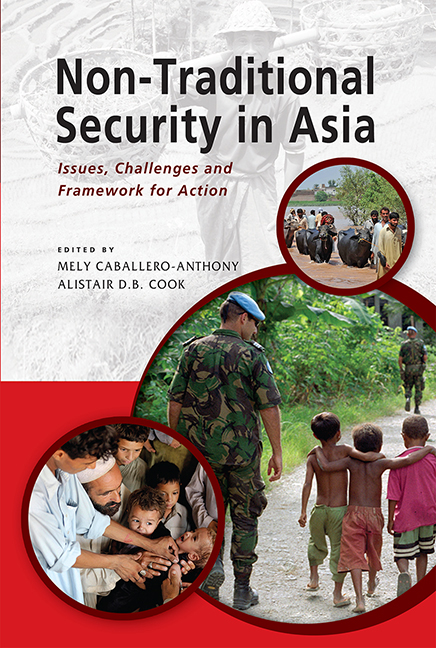11 - Conclusion
Published online by Cambridge University Press: 21 October 2015
Summary
Throughout this book, the contributors have systematically engaged with nine non-traditional security (NTS) threats that face Asian states and societies today. These NTS challenges both in new and ongoing scenarios highlight the strengths and weaknesses of international, national and local responses to them. The different crises under investigation that confronted Asia point to a number of key points and lessons learnt which are hopefully utilized by the policy-making community to mitigate the impact of many of these NTS threats in the immediate future, and also provide evidence to inform longer term debates.
As the region continues to grapple with a host of NTS challenges, be it another outbreak of an infectious disease, natural disasters or the outbreak of internal conflicts, there is no longer any excuse for a lack of preparedness. Within the ASEAN and ASEAN Plus Three frameworks, there are already enough initiatives to enhance regional cooperation in pandemic preparedness and disaster relief. It is time to put more effort into implementing many of these plans and critical to this is the political will by governments to put in place systems and resources to translate many of these plans into actionable deeds.
Whether the region faces challenges in health or disaster preparedness, it is evident that working with other partners, governments, NGOs, civil society and other stakeholders is important. Many of these NTS issues do not only have transnational reach but have also become more complex. Thus, conventional responses to address many of these issues are no longer adequate. While inter-agency coordination is indeed important to deal with complex emergencies within a national domain, more often than not, government resources are limited. In dealing with human insecurities brought on by climate change, the proliferation of small arms and light weapons, an economic downturn, natural disasters and disease outbreaks, there is an increasing realization that global and regional institutions should work closely with national and local partners. This is to ensure that decisions are made at the most appropriate level and the necessary human and financial resources are channelled effectively.
- Type
- Chapter
- Information
- Non-Traditional Security in AsiaIssues, Challenges and Framework for Action, pp. 290 - 294Publisher: ISEAS–Yusof Ishak InstitutePrint publication year: 2013



